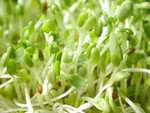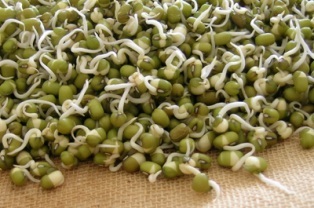In WWII the government was expecting food shortages and funded research to find out what we would do if meat, dairy, and eggs were scarce. There results showed that sprouts were an adequate substitution to keep us healthy!
Since my mom had cancer and it runs in my family, I am totally motivated by health. Anything I can do to qualify for that destroying angel to pass by me, I am all for! And plants are at their healthiest when they are babies--sprouts! This includes all sprouted nuts, seeds, and grains.

The protein actually increases when you sprout it and that protein is easier for the body to use. How much protein can you get from plants? 4 oz of sprouts have as much protein as 4 oz of a t-bone steak.
The nutritional value of a seed skyrockets! Oats sprouted for 5 days have 600% more vitamin C (as I learned from Layne), 500% more B6, 600% more folic acid, 10% more B1, and 135% more B2.
The sprouting process uses up the calories and the stuff that gives us gas and digestive problems.
Another great thing about sprouts is that we can eat healthy as still save money. You can get over 50 servings for the cost of a pound of beans. 3 tablespoons of mung beans will make 4 cups of sprouts. If you are one of those people who prefer organic when you can
 afford it, organic sprouts are always a great deal, because just a little grows into a whole lot!
afford it, organic sprouts are always a great deal, because just a little grows into a whole lot!They're easy to use, as they don't require a lot of cutting and peeling. You can eat them straight out of the sprouting jar or lightly cook them--the cooking time and temperature decrease when you sprout. They're sweeter and softer than the seed they came from. We eat them almost every day in our hot breakfast cereals, and add them to sandwiches, salads, soups, tacos, and baked goods. There are some recipe books out there, but I just add them to whatever I normally make.
So, how do you do sprout? Here are the basics: Rinse 3/4 C wheat, beans, rice, or other seed, and soak overnight (or 12 hours) in a clean Quart jar with a plastic mesh sprout lid (available at your local health food store). Rinse and place jar in a bowl so that it tilts about 45 degrees--so that excess water will drain out. Rinse 2-4 times or more per day (the more the better) until sprout is about as long as the original seed. Rinse and store, covered well, in the fridge for up to a week (rinse every few days).
If there is a natural disaster, here are the directions to some seeds you might already have that could save you life. ;)
 Use all the sanitation practices you normally would, like washing
the jars in hot water, and not touching the seeds unnecessarily. You
only want the sprouts to grow and not any extra little germies. If in
doubt, cook it!
Use all the sanitation practices you normally would, like washing
the jars in hot water, and not touching the seeds unnecessarily. You
only want the sprouts to grow and not any extra little germies. If in
doubt, cook it!Here are some websites I recommend to order online or learn more about sprouts:
http://www.sproutpeople.com
http://www.sproutman.com
Enjoy!
No comments:
Post a Comment